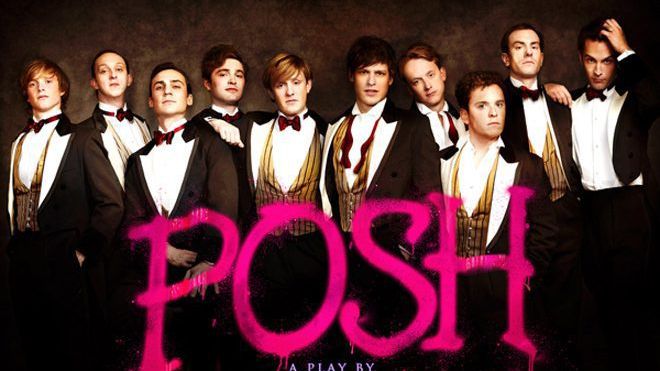

Where To Take Her – Posh The Play
Words: Gentleman's Journal
By Tatiana Hambro
Gentleman, know this: fine breeding, wealth and an education at Oxford does not a gentleman make. Trot on down to the Duke of York’s theatre to discover why.
Laura Wade’s play, Posh invites you to witness an evening with Oxford University’s “Riot Club” aka the infamous Bullingdon Club, whose members include only the most privileged and socially elite students and whose premise is to drink, damage and destroy wherever they dine, avoiding all consequential penalties by offering a healthy sum of cash at the end of the circus. Posh takes place in a rural gastro-pub just outside of Oxford (the Bullingdon Club was banned from Oxford in the 20s after members vandalised Peckwater Quad in Christ Church.) Landlord Steve, and his plucky daughter Rachel serve the 10 members throughout the evening and there is an unexpected guest by the name of ‘Charlie’.
New to the Duke of York’s Theatre but not the stage, the play was first shown professionally in April 2010 at The Royal Court in suitably posh Sloane Square. The move to central London brings with it not only slight changes in audience but also in script; references to the coalition government and the London riots of last year propel the story right into the ‘now’. This is important, because it is by no means the first time The Bullingdon Club – and all that it represents – has been satirized. Evelyn Waugh’s 1928 novel Decline and Fall presents a malicious, and yet hilariously comic, satire with its tale of ‘The Bollinger Club’. Wade’s play does not yield quite the same level of farce, which is a shame really, because the serious point is made all the same.
Unexpected creativity flares in this production and that’s where all the real, hearty laughs are. Rap, dance, lighting and song are all used to brilliant comic effect whilst also making a political point by closing the gap between the behaviors of two opposing social classes: a riot is a riot, be it in Hackey or Henley. Nice touches are added with subtle precision: the opening scene sees young club-member ‘Guy’ speaking with old-club member and Godfather ‘Jeffrey’, or, as Guy refers to him ‘Uncle Jezza’ and is phonetically echoed during the rendition of ‘Pass Out’ by Tinie Tempa – (“Uncle Fester”.)
The humour, in Posh, is challenging. In order to enjoy the play, you have to laugh with the club, alongside them. Colloquial language: “jokes”, “chunder”, “mate” etc is deployed in order ease the audience into the group. Some refused to do so and walked out. There’s a good line about Bristol University (where Wade went) and a great gag about getting mugged. As the evening progresses though, enjoying the play becomes increasingly more difficult and uncomfortable. No one is in stitches over the ‘jokes’ that are really unashamed misogyny or racism, and no one is meant to be, either. The club begins to splinter apart and the plot takes a dark turn, reminiscent of The Lord of the Flies.
A top performance by Leo Bill as wildly arrogant but intelligent Alistair gives some sensitivity to the perhaps otherwise too-brutal characterization – though he has a superbly written monologue just before the interval. Still, I can’t help but wonder that if Wade had managed to resist writing such a fatal ending, her satire would be all the more poignant. Catch the party before it ends, on Saturday 4th August 2012. poshtheplay.com
,


